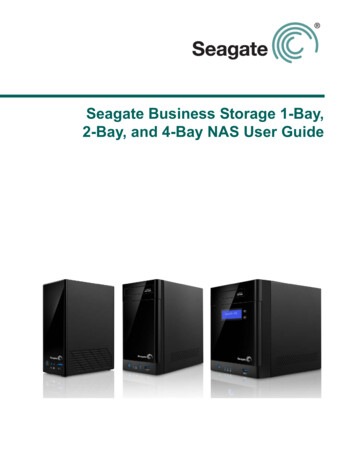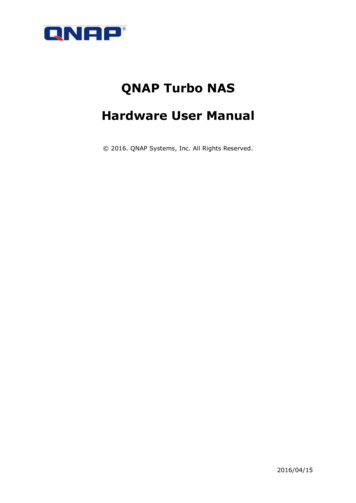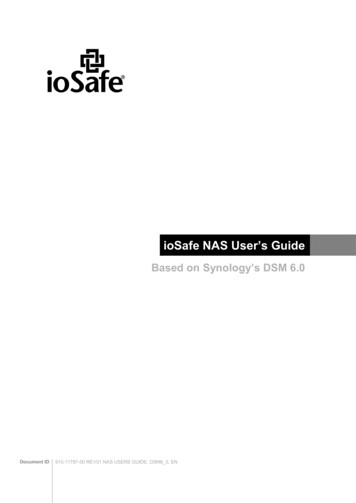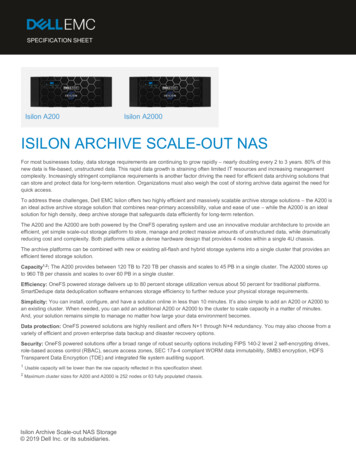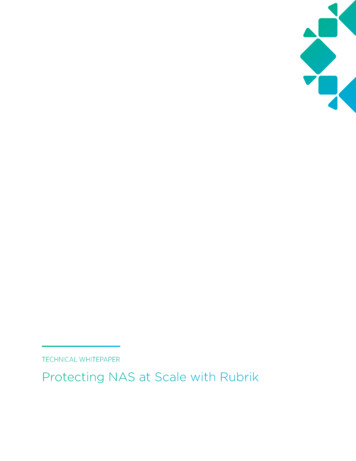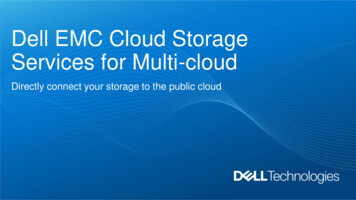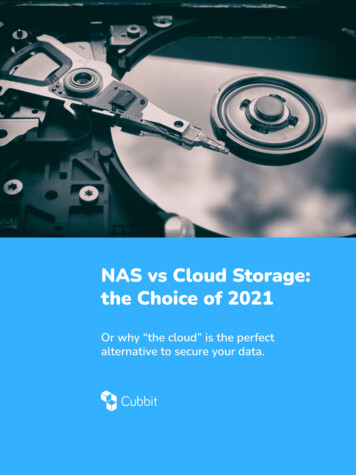
Transcription
NAS vs Cloud Storage:the Choice of 2021Or why “the cloud” is the perfectalternative to secure your data.
IntroductionWhen it comes to data storage and backup, there are many options available - fromcomputer storage to in-house server infrastructure.If you're one of those whose attention has been caught by NAS, you’ve probably felt likethat little, powerful device was finally offering you a personal place to store your datasecurely. Certainly, this equates to a unique feeling - you finally feel like your data is trulyyours.However, this has probably also raised some concerns and obstacles. We're talking about: Hardware malfunction & power shortage (50% of hard drives fail every five years). Concentration switching ( 8,100 annual loss per employee). Cybersecurity vulnerabilities (every 39 seconds a cyber attack happens).The goal of this eBook is to break down the key evaluation points when it comes tochoosing a NAS to store data and why cloud storage can be a viable alternative to yourstatus quo. 2021 Cubbit2
1. PerformanceLet’s start with internet speed: both NAS and cloud storage need a fast,home connection to work reliably.While NAS uses the maximum possible bandwidth to transmit data, cloudstorage solutions apply upload and download bandwidth quotas undercertain conditions, as is the case with Dropbox & MEGA. Playing aroundwith bandwidths can make operations optimized but negatively affects theuser experience.However, by adopting a distributed cloud system, you have full bandwidthavailable to boost your performance.Learn more: Cubbit vs NAS 2021 Cubbit3
2. ReliabilityWhile internet speed is critical to move and store data smoothly, it’s alsocrucial to save private information on a reliable system.The NAS is a piece of hardware: data is stored there and only there. That’swhy many times copies of documents are made manually in order toensure redundancy and not lose valuable information due to unexpectedfailures.Fifty percent of hard drives fail every five years, and when that happensyou lose all of your stored data. On top of that, when a NAS malfunctionoccurs, all of your expensive investment is wasted and you have to moveyour hard-drives somewhere else.Another problem that often happens with NAS is the need to keep itconstantly plugged into electricity. Not only is this environmentallyunfriendly, but imagine what can happen in the event of a power shortage- the inaccessibility of your data will keep your teamwork blocked.Those two scary scenarios can’t happen with cloud storage services.The off-site backup option in the cloud is hardly affected by disastersand aging issues (or even physical thefts!), while data can only be easilyaccessed through a laptop and a hotspot (e.g. from your mobile phone).There's just one problem: when we talk about "the cloud" we're notreferring to something intangible, yet your data is often stored in a serverfarm somewhere in the world.A real life case - OVH datacenterBased in Strasbourg, OVH is the largest data center in Europe.On March 9 - 2021, a fire destroyed SBG2 (one of its servers), anddamaged other facilities. There were a few days of panic, making data 2021 Cubbitunavailable for businesses at the time (with others' data being lost forever).4
However, there are cloud solutions that don't need a data center to run.Creating a service that is: More private and secure (i.e. end-to-end, zero-knowledge encrypted). Disaster-proof (i.e. natural redundancy and no physical center). Greener (i.e. it saves CO2 per file stored).Related reading: What is distributed cloud storage? 2021 Cubbit5
3. ProductivityAs an output of the previous section, productivity is something to considerwhen choosing between NAS and Cloud Storage.When you opt for such a physical asset, not only have you to pay for it withmoney upfront, but other types of costs are required as well. As we sawin the previous section, whether you're fixing a photo or updating an ITproject, an unexpected event (e.g. a power outage) can stop the flow.In fact, to work and be productive, our brains need to enter a psychologicalstate of concentration that takes 15-20 minutes to achieve and can beinterrupted in a second. Slowing down definitely.Let's take a look at this statistic from the Washington Post:Mentally restarting from an interruption takes 84 minutes 50 minutes instress and fatigue - on top of the hardware malfunctioning issue.Washington PostCloud storage solutions outsource these thoughts, asking only a small feein exchange for the entire service and allowing you and those around, toconcentrate on the things that really matter. 2021 Cubbit6
4. SecuritySpeaking of security, NAS is not the best way when it comes to protectingstored data - thanks to additional services you can potentially lightlyencrypt your information, but that’s it.Differently, with cloud services you can find a wide range of brands offering from the lowest to the highest level of protection.Although major service providers like Dropbox and Google Drive havefallen under data breaches in the past (e.g. the former with the 2012 databreach, where 68M users' data was leaked), zero-knowledge cloud storagesolutions secure your data with state-of-the-art encryption.The highest level of security is called zero-knowledge encryption, andwhen it comes into play, not even the service provider can access the datastored.Here’s an article on the most secure cloud storage solutions - in case youwant to dig deeper.Insider tip 2021 CubbitIf you choose to rely on a zero-knowledgeThat's why many solutions are focusingencrypted service, the power of the dataon increasing levels of protection at thewill belong only to the person who holdslog-in stage. 2-factor authentication (2FA)the private key. This is the only way to gainbecomes a must-have: secure your data andaccess to the information.find out how 2FA works.7
5. PricingSo far, we’ve considered the key elements when it comes to the choicebetween NAS and cloud storage. Let’s now think about the cost aspect.Not only is the NAS priced very high ( 500- 1000 or so), but you alsohave to integrate it with hard drives depending on the space required.In addition, if you need more storage you have to buy new hard drives andinstall them - until the established space threshold is filled up. As we sawin the “productivity section”, there are other costs on top of the money youpay.While the cloud has a lower storage capacity, you don’t have to worryabout storage upgrades: they’re within a click of your mouse and with ITservice included (i.e. you don't have to worry about how to fix glitches, thisis an integrated service).Think now that with datacenter-less cloud storage you can pay a veryaffordable price (no server farms to fund here!) compared to big cloudplayers like Dropbox, while benefiting from state-of-the-art security.Learn more: Cloud Storage Comparison. 2021 Cubbit8
NAS backup to the CloudSo far, we have considered a this or that only scenario. Anyway, manyare the people who already have their data stored on NAS - making a fullmigration cumbersome to imagine.This is where the choice to rely on both NAS and the cloud comes in.A key reason driving this decision is the fact that backing up NAS to thecloud allows people to access their data from wherever they are, whilecreating an off-site backup copy.MM Svendsen in BerlinMax Micozzi Svendsen is a Berlin-based sound designer who hascomposed music for several brands, including Nike and Red Bull.He was looking for a way to back up 100% of his projects while workingwith external collaborators. Zero-knowledge cloud storage was the answerto his needs - Read the Story.What's more, choosing the right cloud provider can achieve this withcomplete security and without the need for any VPNs: your backup datawill be zero-knowledge encrypted and your information will be managedto comply with the strictest privacy policies.Last but not least, if something happens to your NAS (be it a malfunctiondue to aging or any disaster - check section "2. Reliability" above) you’llstill be able to read the off-site copy of your data.In the next section we’ll see how the 3-2-1 backup rule will help youachieve peace of mind. 2021 Cubbit9
How to build your recovery plan with the3-2-1 backup ruleIn the previous section, we looked at the benefits of create synergy between your currentstorage solution (e.g. NAS) and the cloud - let's now consider how to build your recoveryplan with the 3-2-1 Backup rule.What is the 3-2-1 backup rule? It's a tried-and-true method for securing information andenabling instant data recovery in the event of a disaster or cyber attack of any kind.It has also become the best advice when it comes to Ransomware attacks - this virustargets any lucrative firm or individual, encrypts all their information and demands a fee tohave data back.How does it work? The 3-2-1 backup rule is made up of 3 mantras: 2021 Cubbit You should keep 3 copies of your data (at least!). The information must be saved in 2 different storage devices. 1 backup copy must be stored in a remote location (i.e. offsite storage or the cloud).10
This way, you’ll be able to recover all your data instantly. Especially considering thathackers have started targeting QNAP NAS using 7-zip to encrypt data & asking for bitcointo free them.However, while this practice can be super-useful for working with peace of mind, it canwaste a lot of time when backing up to all these places on a regular basis.With Cubbit’s selective sync feature, you have disaster recovery at your fingertips and avoidbeing blackmailed by ransomware. Choose which of your files will only be stored online and which will also be stored locallywith a click. If ransomware targets your computer, it won't be able to hit the filebackup on Cubbit. You’ll recover everything in no time - you can find more informationhere.Along this eBook we have been comparing the pros and cons of NAS vs Cloud storage allalong, getting to a point where we are trying to combine the benefits. But, why not find asolution that combines the advantages of both? In the next section we will see how Cubbitcan be the answer. 2021 Cubbit11
Try a Cubbit Cell 100% security easeof useCubbit Cell is a one-time-payment personal cloud storage that’s 100% private.Combining the security of NAS with the ease of use of the cloud - Cubbit becomesthe perfect NAS alternative for storing all your most sensitive information in anunhackable location that is accessible from anywhere and unaffected by breakage.All this without annoying monthly fees.Cubbit is not only based in Europe, which means it’s a GDPR-friendly service (i.e. noPatriot Act rules apply to the enforcement of data reading), but it also offers a zeroknowledge, end-to-end encrypted cloud storage service - no one, (not even Cubbit!)can access the data you have uploaded.One-time paymentJust like NAS: pay once and enjoy free storage for a lifetime (and 4 years ofwarranty). Plus, not relying on a data center equates to affordable pricing.Security (ZK redundancy)Zero-knowledge encryption means that only those who are authorized can accessthe data (not even Cubbit can read it!).User-friendliness & accessibilityAs with the Cloud: sync data across all your devices, share with one click, and accessinformation even when you're away from home.Disaster-proofUnlike NAS (and cloud data-centers), if your Cubbit Cell goes offline you can stillaccess your data because it’s distributed over a p2p network of nodes.Free up storage space!Selective sync frees up space on your computer. You choose which folders tosynchronize and which to keep only on the cloud.ExpandableNeed more storage? Expand your space up to 4TB by connecting external HardDrives, without thinking about boring (and expensive) fees.Order your Cubbit Cell and start securing your data today. 2021 Cubbit12
About CubbitCubbit is the datacenter-less cloud provider, recycling underutilized internet resourcesinto the most privacy-guardian, cost-efficient and green cloud services available on theworldwide market.Cubbit is the first cloud provider that does not store users’ files in centralized, proprietarydata centers. Instead, the company’s distributed technology offers users the opportunityto store data in a 100% private and secure cloud space which saves 400kg every 10 TBstored per year, making it 70% more sustainable compared to traditional cloud storagesolutions.40,000kg of CO2 emissions each year (per PB stored). Cubbit Cells work together, like beesin a swarm, to create an unparalleled peer-to-peer network.Cubbit has raised 3.3M from multiple investors and grants, supporting deep tech R&D.Cubbit also entered into the top 1% of Kickstarter campaigns ever. Cubbit counts Techstars,CERN and Barclays amongst its global partners and has achieved international recognitionthrough multiple awards granted by organizations such as Mastercard, TIM, and theEuropean Commission.Cubbit is headquartered in Bologna, Italy and has a branch in Tel Aviv, Israel.Phone number: 39 347 97 33 457Email: hello@cubbit.ioWebsite: www.cubbit.ioAddress: Via della Zecca 1 - 40121 - Bologna (BO) - Italy 2021 Cubbit13
NAS backup to the Cloud So far, we have considered a this or that only scenario. Anyway, many are the people who already have their data stored on NAS - making a full migration cumbersome to imagine. This is where the choice to rely on both NAS and the cloud comes in. A key reason driving this decision is the fact that backing up NAS to the


